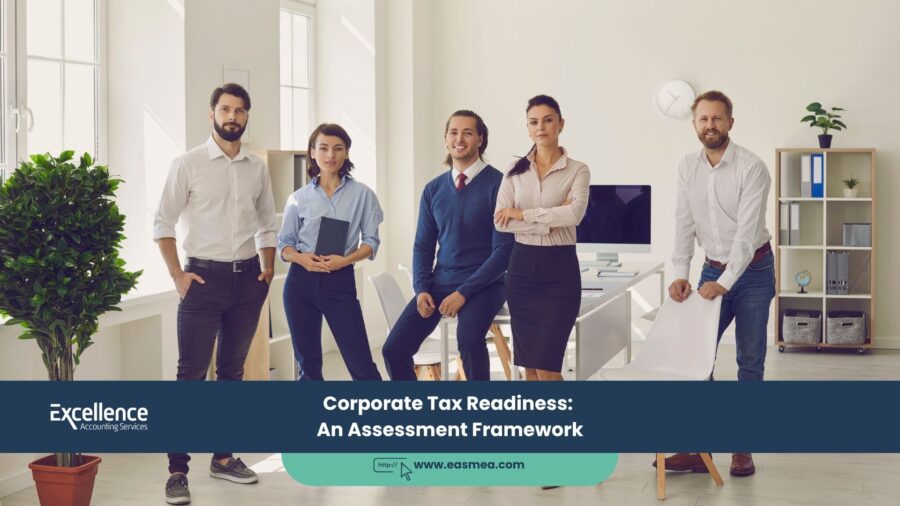Corporate Tax Readiness: An Assessment Framework
The introduction of Corporate Tax in the UAE marked a fundamental shift in the nation’s business and financial landscape. For the first time, the majority of companies are required to calculate and pay tax on their profits. While the initial deadlines for registration and filing may seem distant, the truth is that readiness for Corporate Tax is not a last-minute task—it’s a year-long process of preparation, system alignment, and strategic planning. Waiting until the end of your financial year to think about tax is a strategy destined for failure, likely resulting in inaccurate filings, missed deductions, and costly penalties.
- Corporate Tax Readiness: An Assessment Framework
- The Four Pillars of Corporate Tax Readiness
- Pillar 1: Financial & Data Integrity Assessment
- Pillar 2: Systems & Technology Assessment
- Pillar 3: People & Processes Assessment
- Pillar 4: Legal & Structural Assessment
- From Assessment to Action with Excellence Accounting Services (EAS)
- Frequently Asked Questions (FAQs)
- Are You Truly Prepared for Corporate Tax?
So, how do you know if your business is truly ready? Corporate Tax readiness goes far beyond simply appointing a tax advisor. It involves a holistic review of your company’s financial systems, data integrity, internal processes, and legal structure. To navigate this complex new requirement, businesses need a structured approach—a comprehensive framework to assess their current state, identify critical gaps, and create a clear roadmap to full compliance. This guide provides that framework. We will break down the essential pillars of Corporate Tax readiness, offering a detailed checklist you can use to evaluate your organization and ensure you are not just compliant, but strategically prepared for the new tax era.
Key Takeaways for Corporate Tax Readiness
- Readiness is a Continuous Process: It starts on day one of your financial year, not one month before the tax return deadline.
- It’s More Than Just Finance: True readiness involves your legal, IT, and operational departments, not just the accounting team.
- Data is the Foundation: The accuracy and accessibility of your financial data will determine the ease and correctness of your tax filing.
- Systems Must Be Tax-Aware: Your accounting software and processes must be configured to capture data in a tax-compliant manner.
- Proactive Assessment Prevents Panic: Identifying gaps early through a structured assessment allows you to fix issues methodically, avoiding a last-minute crisis.
The Four Pillars of Corporate Tax Readiness
Our assessment framework is built on four critical pillars. A thorough evaluation of each pillar will give you a 360-degree view of your company’s readiness level.
- Pillar 1: Financial & Data Integrity
- Pillar 2: Systems & Technology
- Pillar 3: People & Processes
- Pillar 4: Legal & Structural Analysis
Pillar 1: Financial & Data Integrity Assessment
This is the bedrock of your tax compliance. The most sophisticated tax strategy is worthless if it’s based on inaccurate or incomplete data. Your goal here is to ensure your financial records are a “single source of truth.”
Assessment Checklist:
- Chart of Accounts (CoA) Review: Is your CoA sufficiently detailed for Corporate Tax? Does it segregate non-deductible expenses (e.g., fines), partially deductible expenses (e.g., client entertainment), and different income streams (e.g., exempt, foreign-sourced)? A generic CoA is a major red flag.
- Regular Reconciliations: Are all bank accounts, accounts receivable, and accounts payable ledgers reconciled on a timely basis (at least monthly)? Unreconciled accounts are a primary source of financial errors.
- Fixed Asset Register: Do you maintain a detailed register of all fixed assets, including purchase date, cost, and accumulated depreciation? This is crucial for verifying depreciation expenses.
- Supporting Documentation: Is every transaction in your ledger supported by a valid document (e.g., tax invoice, contract, receipt)? Are these documents easily retrievable? This is the core requirement of any external audit.
- Financial Statement Accuracy: Do your regular financial reports (P&L, Balance Sheet) present a true and fair view of the company’s performance and position? This is the starting point for your tax calculation.
If you answer “No” or “Unsure” to any of these points, your foundational data is weak, and this must be your first priority. A professional accounting review can be an invaluable first step.
Pillar 2: Systems & Technology Assessment
Your technology stack, particularly your accounting software, is the engine that processes your financial data. It must be configured to support, not hinder, your compliance efforts.
Assessment Checklist:
- Software Capability: Can your current accounting software support a customized, tax-optimized Chart of Accounts? Can it track different tax treatments for expenses? Legacy systems or basic spreadsheets often fail this test.
- System Integration: If you use multiple systems (e.g., CRM, e-commerce platform, inventory management), do they integrate seamlessly with your accounting software? Poor integration leads to manual data entry, which is a major source of errors.
- Automated Reporting: Can your system generate the detailed reports needed for tax calculations? This includes P&L by division, detailed expense reports, and summaries of related party transactions.
- Data Accessibility & Security: Is your financial data securely stored and accessible to authorized personnel? Cloud-based platforms like Zoho Books offer significant advantages in both security and accessibility.
- VAT & CT Coexistence: Does your system manage VAT compliance effectively? A system that handles VAT well is often a good indicator that it can be configured for Corporate Tax.
Your accounting system should be a tool for compliance, not an obstacle. An effective accounting system implementation is critical for readiness.
Pillar 3: People & Processes Assessment
Even the best systems will fail if the people using them are not properly trained or if the internal processes are weak. Compliance is a team effort.
Assessment Checklist:
- Team Knowledge: Does your finance team understand the basics of the UAE Corporate Tax law? Do they know which expenses are non-deductible? Have they received training?
- Defined Processes: Are there clear, documented processes for key financial tasks like invoice processing, expense reimbursement, and month-end closing? Consistency is key to accuracy.
- Internal Controls: Do you have checks and balances in place to prevent errors and fraud? This includes approval workflows for payments and segregation of duties. A robust system of controls is often evaluated during an internal audit.
- Roles & Responsibilities: Is it clear who is ultimately responsible for Corporate Tax compliance within your organization? Who is responsible for maintaining the accuracy of the financial records?
- Advisory Support: Have you engaged with external tax consultants? Do you have access to expert advice when complex issues arise?
Pillar 4: Legal & Structural Assessment
Corporate Tax interacts directly with your company’s legal structure and agreements. An assessment in this area can reveal both risks and opportunities.
Assessment Checklist:
- Group Structure: If you are part of a group of companies, have you evaluated the possibility of forming a Tax Group? Have you analyzed all inter-company transactions for transfer pricing risks?
- Free Zone Status: If you are a Free Zone entity, have you thoroughly assessed whether you meet all the conditions to be a Qualifying Free Zone Person and benefit from the 0% rate?
- Contracts & Agreements: Have key legal agreements (e.g., financing agreements, shareholder agreements) been reviewed for any tax implications?
- Transfer Pricing: Have you identified all transactions with Related Parties and Connected Persons? Is there a process in place to ensure these transactions are at arm’s length and properly documented?
- Entity Classification: Is your business correctly classified for tax purposes? This is especially important for unincorporated partnerships or other unique structures. A company formation expert can provide clarity.
From Assessment to Action with Excellence Accounting Services (EAS)
This assessment framework can highlight critical gaps in your readiness. EAS provides the expert services needed to close those gaps and build a robust compliance function.
- Comprehensive Tax Readiness Assessment: We conduct a deep-dive analysis of your business against this framework, providing you with a detailed report of findings and a prioritized action plan.
- Bookkeeping & Accounting Services: We clean up historical records and provide ongoing bookkeeping services to ensure your data is precise and tax-ready.
- Tax Filing and Advisory: Our experts handle the preparation and filing of your Corporate Tax returns, ensuring accuracy and compliance while optimizing your tax position.
- Strategic Business Consultancy: We provide high-level advice on structuring, transfer pricing, and other complex areas to ensure your business is not just compliant, but tax-efficient.
Frequently Asked Questions (FAQs)
The ideal time is at the very beginning of your first financial year that is subject to Corporate Tax. This gives you the maximum amount of time to identify and fix any issues in your systems and processes before the tax year ends.
Yes. The principles of Corporate Tax apply to all businesses that meet the revenue threshold. While your assessment might be simpler, you still need to evaluate the same pillars: accurate data, a capable system (even if it’s simple software), clear processes, and the correct legal understanding. The risks of non-compliance are the same regardless of size.
The most common weakness is in Pillar 1: Financial & Data Integrity. Many businesses have historically operated with informal or imprecise bookkeeping. The lack of a detailed, tax-optimized Chart of Accounts is a frequent and critical gap that makes all subsequent compliance steps difficult.
A business owner or internal finance team can certainly use this framework to perform a preliminary self-assessment. This is a valuable exercise. However, engaging an external consultant brings an objective perspective and deep expertise in the tax law that an internal team may lack, especially when it comes to complex areas like transfer pricing or free zone qualifications.
This depends on the size and complexity of the business. For a small to medium-sized enterprise (SME), a thorough assessment by a professional firm might take anywhere from one to four weeks.
This is the primary purpose of the assessment—to find gaps early. If major issues are found, the consultant will provide a roadmap with prioritized, actionable steps to remedy them. This might include a bookkeeping clean-up project, an accounting system upgrade, or team training sessions.
VAT readiness is primarily transactional and focused on the correct treatment of individual sales and purchases on a frequent (quarterly) basis. Corporate Tax readiness is more holistic. It looks at the entire annual performance, requires more complex adjustments to accounting profit, and involves deeper strategic considerations like group structuring and transfer pricing.
No. An accountant can only file a tax return based on the data you provide them. If your data is inaccurate, incomplete, or poorly structured, the resulting tax return will also be flawed. True readiness means ensuring the data your accountant receives is already clean, organized, and compliant. Their job is to prepare the return; your job is to be ready with the right information.
A modern, cloud-based accounting software with a customizable Chart of Accounts. This is the central hub for all financial data and the primary tool for achieving the data integrity and reporting capabilities required for compliance.
It’s best to conduct a group-level assessment. This allows you to evaluate not only each individual company’s readiness but also the critical inter-company aspects, such as the potential to form a tax group and the management of transfer pricing policies across all entities.
Conclusion: Readiness is a Choice
In the new tax landscape of the UAE, Corporate Tax readiness is not a default state; it is a conscious business choice. It’s the choice to be proactive over reactive, to be organized over chaotic, and to be strategic over compliant. By using a structured assessment framework like the one outlined here, you can move beyond uncertainty and hope. You can systematically measure your capabilities, identify your weaknesses, and build a robust compliance function that not only meets the FTA’s requirements but also strengthens your business’s financial discipline and strategic foresight.



